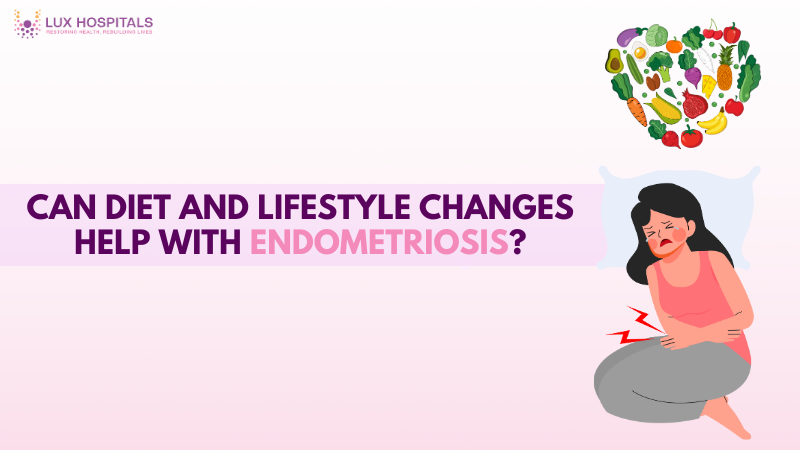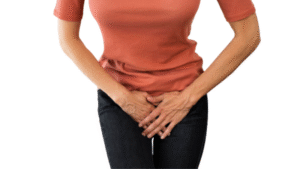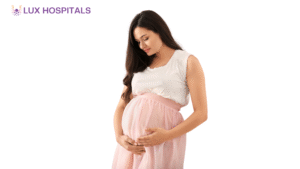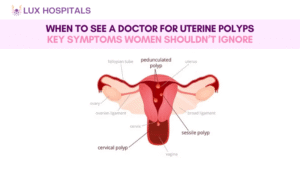Can Diet and Lifestyle Changes Help with Endometriosis?

Endometriosis is a persistent, painful disorder where tissue that resembles the lining of the uterus develops outside of it. This can lead to inflammation, pain, digestive issues, and fertility problems. While medical treatments are available, many women explore natural approaches like dietary and lifestyle changes to help lessen symptoms and enhance their standard of living.
This blog explores how diet and lifestyle changes can support women living with endometriosis, reduce inflammation, and promote hormonal balance.
Understanding Endometriosis and Its Challenges
An estimated 10% of women who are of reproductive age have endometriosis. The misplaced endometrial-like tissue responds to hormonal fluctuations, resulting in infertility, pelvic discomfort, and uncomfortable periods. Since the immune system and inflammation play significant roles in the disease, targeting these through diet and lifestyle can provide relief.
1. The Anti-Inflammatory Diet and Endometriosis Relief
One of the leading causes of endometriosis progression is chronic inflammation. Foods high in omega-3 fatty acids are part of an anti-inflammatory diet. Fiber and antioxidants include leafy greens, berries, fatty fish, and nuts. Cutting back on red meat, processed foods, and
2. Reducing Estrogen-Boosting Foods
Endometriosis is an estrogen-dependent condition, so lowering excess estrogen can help manage symptoms. Avoiding high-fat dairy, alcohol, red meat, and non-organic produce may reduce estrogen levels. Incorporating fiber-rich foods helps the body eliminate excess hormones naturally.
3. Going Gluten-Free and Dairy-Free
Many women with endometriosis report symptom improvement after eliminating gluten and dairy. These foods can trigger inflammation and digestive discomfort. A gluten-free and dairy-free diet may also promote intestinal health, which is intimately related to the immunological system.
4. Boosting Gut Health for Hormonal Balance
The gut microbiome helps regulate estrogen levels, and a healthy digestive tract can aid in endometriosis management. Adding prebiotic-rich foods like garlic, onions, and asparagus, and probiotics from yogurt or fermented foods, strengthens gut flora. A healthier gut may improve nutrient absorption and reduce overall inflammation.
5. Incorporating Supplements for Endometriosis
Certain supplements may help reduce endometriosis symptoms. Omega-3 fatty acids, magnesium, vitamin D, and curcumin (found in turmeric) have anti-inflammatory properties. A healthcare professional should always be consulted before beginning any supplement regimen.
6. Staying Hydrated to Flush Out Toxins
Water is vital for detoxification and reducing bloating, which is essential in endometriosis care. Try to consume eight to ten glasses of water daily—teas made from herbs, such as chamomile or ginger, aid digestion and ease cramps.
7. Managing Stress and Cortisol Levels
Because stress alters hormones and the immune system, it can exacerbate the symptoms of endometriosis. be reduced by mind-body techniques such as acupuncture, yoga, meditation, or deep breathing. Mental health must be given top priority in a comprehensive treatment plan.
8. Regular Exercise for Pain Management
Gentle physical activity helps reduce estrogen dominance and improve circulation, which may ease endometriosis pain. Low-impact activities like swimming, walking, or Pilates support lymphatic drainage and mood stabilization. Consistency is key—30 minutes most days can make a difference.
9. Improving Sleep Habits
Poor sleep can increase inflammation and worsen hormonal imbalances. Women with endometriosis should aim for 7–9 hours of restful sleep each night. Reducing screen time and establishing a relaxing evening ritual can improve the quality of your sleep.
10. Avoiding Environmental Toxins
Toxins like BPA, dioxins, and phthalates can mimic estrogen and disrupt hormones, which may worsen endometriosis. Switch to glass or stainless-steel containers, natural cleaning products, and paraben-free skincare. Reducing toxic exposure can be a crucial part of an endometriosis-friendly lifestyle.
Conclusion
While endometriosis can be challenging to manage, a holistic approach combining diet and lifestyle changes can offer meaningful relief. Daily habits can reduce inflammation, support hormonal balance, and improve gut and immune health. Though these changes may not cure endometriosis, they empower women to take control of their health and naturally improve their quality of life.
Frequently Asked Questions
Women with endometriosis should avoid red meat, processed foods, dairy, gluten, caffeine, and alcohol. These foods may increase inflammation or estrogen levels. A whole-food, plant-rich diet is often recommended.
Lifestyle modifications, including consistent exercise, stress management, and improved sleep, can significantly affect the symptoms of endometriosis. These practices support hormone balance and immune health. The best results are obtained when paired with dietary changes.
Low-impact activities such as yoga, stretching, swimming, and walking are excellent for those with endometriosis. These help relieve pelvic tension, improve circulation, and reduce inflammation. Overexertion should be avoided to prevent symptom flare-ups.
A plant-based diet may benefit women with endometriosis by reducing inflammation and supporting hormone detox. Fruits, vegetables, legumes, whole grains, and fibre are abundant in antioxidants. Limiting animal products may lower estrogen exposure.
Maintaining adequate hydration helps eliminate pollutants and lowers bloating, a common issue with endometriosis. Water also aids digestion and can ease inflammation. Herbal teas can provide additional soothing effects.
Endometriosis is fueled by estrogen, which promotes the growth of endometrial-like tissue. Hormonal abnormalities can cause inflammation and worsen symptoms. Dietary and lifestyle changes aid in the natural regulation of these hormone levels.






















